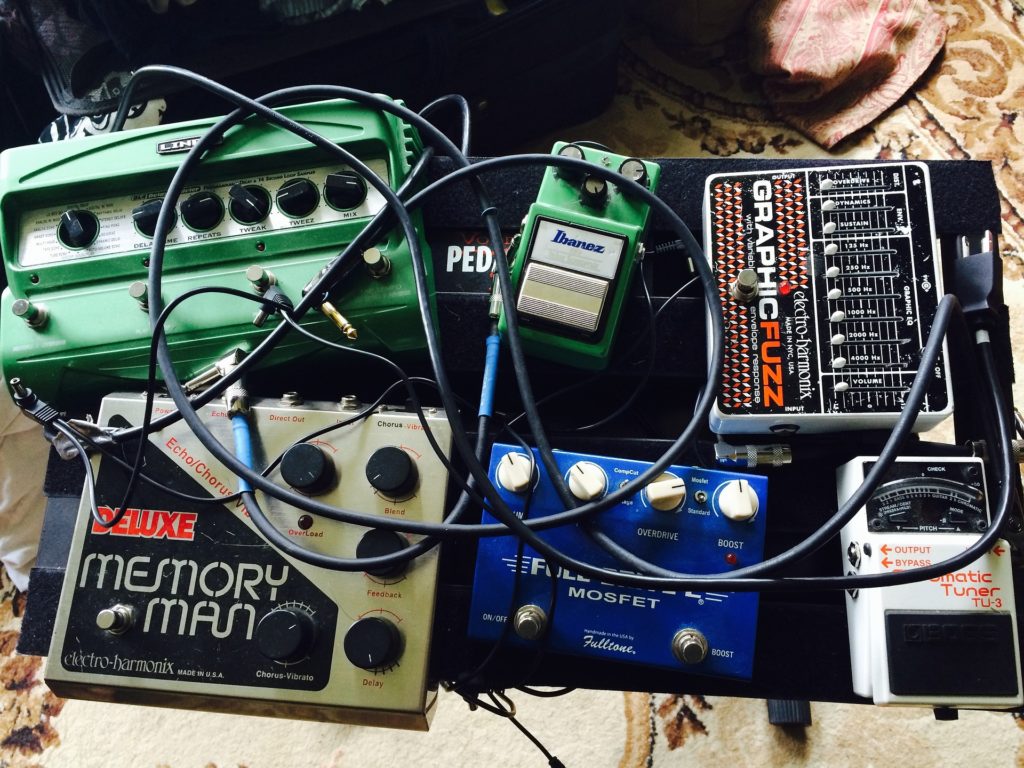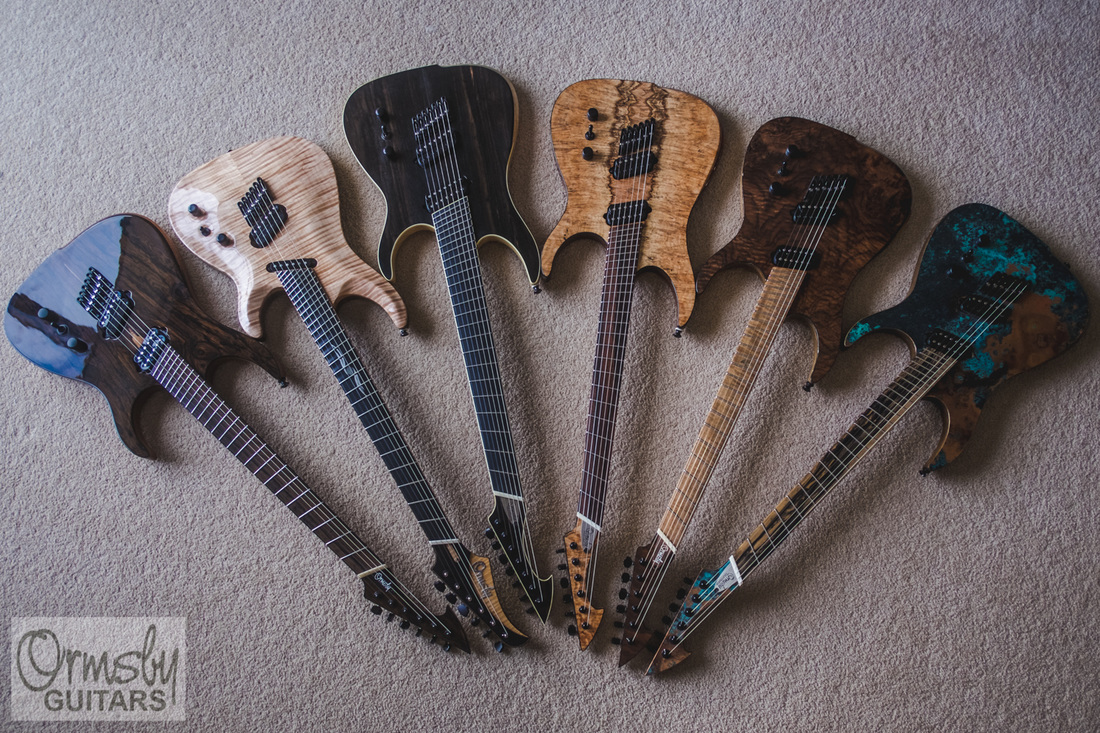Building your first pedal board
 So you have bought your first guitar and amp and now you are looking for a few more ways to change and improve your playing. The next step is obviously pedals! Some people will recommend playing without pedals for the first year, until you are really comfortable with the fret board, timing and your guitar in general, but where is the fun in that? Seriously, if you are passionate about playing and you want to be getting the same tones as some of your favourite players, you will need some pedals to get you there. We have previously looked at where to buy your pedals on the site. I would recommend that you look at second hand pedals as well, brands like Boss are very well known for being built like a tank. Most pedals are made for stomping on stage, so they are likely to stand up to a bit of use before they give in.
So you have bought your first guitar and amp and now you are looking for a few more ways to change and improve your playing. The next step is obviously pedals! Some people will recommend playing without pedals for the first year, until you are really comfortable with the fret board, timing and your guitar in general, but where is the fun in that? Seriously, if you are passionate about playing and you want to be getting the same tones as some of your favourite players, you will need some pedals to get you there. We have previously looked at where to buy your pedals on the site. I would recommend that you look at second hand pedals as well, brands like Boss are very well known for being built like a tank. Most pedals are made for stomping on stage, so they are likely to stand up to a bit of use before they give in.
But, given that you are learning, you will want to have a range of genres to play, so where do you start with your pedal journey? Hold on tight, because this is going to be a long post!
Tuner
The tuner is an easy place to start when you are on your pedal journey, but is it where you want to be investing your money? That really depends on how you play and what you want. If you are a home player only and you have a quiet playing environment there is the ever popular Snark clip on which is very highly rated. There are also a very wide range of tuners that you can download for free on your smart phone. I use ‘Guitar Tuna’ personally and have always been happy with the results.
Then there is the other end of the spectrum – you are wanting to buy something that will last you a long time and will transition easily from home to the stage. In this case you are going to want to buy a pedal tuner, something like the Boss TU-3 or the TC Electronics Polytune. The benefit of a pedal tuner is that it works on the direct input of your guitar and will therefore not get interference from background noise. In addition to this, your tuner will mute your guitar when you are tuning, or any other time when it needs to be muted. Pedal tuners usually also allow you to tune to a range of different tunings, something that you may not get on a clip on or app.
My call though is to go for either a clip on or an app in the early days, especially if you are a beginner, and work up to a pedal tuner later on.
Looper
So, in staying with the theme of pedals that don’t alter your sound, I recommend a looper as one of the most important pedals on your board, especially for the beginner guitarists. Why is that, you may ask? Because a loop pedal cannot just help you to play more that 1 guitar part at a time, but that it will help you hear how well you really are. Using a looper will allow you to play phrases of music that the pedal will then repeat for you. With some pedals you can have a heap of overdubs, where you play parts on top of parts, but others will not have this function.
What you want to use the looper for is to listen to playback of what you sound like, whether your timing is off, and how well your phrasing is. The thing about playing is that you are focussed on playing, so if you can record a small amount and listen back you can then look at what changes you may need to make. Loopers are also really cool just to play with and have fun with, playing a bass riff and then jamming over the top can not only be fun but also help you to work out timing when working with a band. Again, I will recommend the ever trusty Boss pedals, but the looper of the moment is definitely the compact TC Electronics Ditto Looper – very easy to use and takes up next to no space.
Overdrive
Of any of the pedals here, the drive section is the most personal of all, depending on how and what you play. Drive allows you to push the amp a little (or a lot) harder to get those crunchy rock tones. Essentially the drive section can encompass all of the Overdrive, Distortion and Fuzz categories, so what do you go for? My recommendation is…nothing. Yep, that’s right, don’t go buying an overdrive or distortion as one of your first pedals. The reason for this is that a lot of amps have an overdrive channel on them which is responsive to your playing. On a lot of the major brands these channels are serviceable for what you will be playing as a beginner player.
Delay
Delay is the effect that replays your guitar’s signal after you have played a note and can do so in several ways, including decaying the signal until it is no longer heard. Delay is an effect which is heavily used in a lot of music and would be on a lot of both amateur and professional pedal boards. So where do you start? My advice is to start with something from a quality company at a reasonable price. Delay, like many pedals, can come as a simple unit or as a unit which has a thousand different configurations and controls, but is that what you need? What you really want is something that will do repeats, with a mix knob (so you don’t lose your original signal) and maybe a few options, like the choice between tape or digital delay sounds.
In terms of easy and user friendly delay, which gets you a good response, look for something like the MXR Carbon Copy or the Boss DD range (although the DD500 may be a little too much for the beginner guitarist). There is also the TC Electronics Flashback Mini or the full size which also has the benefit of a looper.
Reverb
I’m going to go out on a limb and say that you don’t really need reverb to start off your pedal board. Reverb is really there for the creation of space and personally, I’m not sure whether that really matters, especially in the early days. I have done a review on the Biyang Tri-reverb previously, which was a good unit, but failed quickly (so make sure you buy any lower cost pedals from a reputable dealer with a return policy).
If you are definitely in the market for a reverb unit and that you like the sound, or are working on ambient type noise, then I would recommend the Hall of Fame (mini) or the EHX Holy Grail both of which are made by high quality manufacturers. These type of pedals have simple controls as well, so you won’t have to be fiddling for hours to work out your settings before you even start to play.
Modulation
As a learning guitarist, there is nothing more important that learning the riff to ‘Come as you are’, is there, and what do you need for that riff? Modulation! Whether it be flanger, chorus or any other type of wacky effect, modulation is one of the keys of making your sound different and unique. There are a few options here for a good price, one of those being the classic Boss Chorus range. Another option for modulation effects if the Mooer Mod Factory which has a range of effects in a single unit, cheap, cheerful and plenty of range for some experimentation.
Modulation is also where a lot of high end boutique pedals are situated – places like Earthquaker Devices have built their reputation on the ranges of sound that modulation allows, so expect that mod effects is where you will spend a lot of your time if you decide to continue on a journey into pedal addiction.
The Board
My opinion only, but if you are looking at building your first pedal board – don’t worry about the actual board, you will be paying for something that you won’t get a great deal of use out of. This is especially true if you are a beginner and most of your playing happens in one spot. Find a plank of wood and veclro the pedals to it and you are ready to go. Pedal boards are there for a few reasons: for aesthetics, for moving pedals from one place to another, for performing on stage. They are great and will help with keeping things organised, but in the early days (when you are working out what pedals are the ones for you) they really aren’t a necessity at all.
So what have we missed? Do you have any recommendations of what you would change instead of our recommendations?



Recent Comments